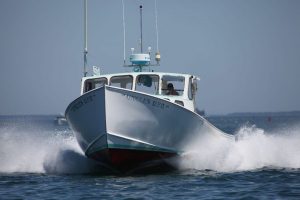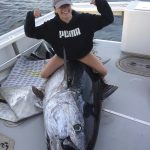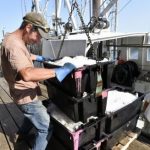Tag Archives: southern New England
$5.4 million to further innovative research and outreach in support of the lobster industry and fishing communities
 The American lobster fishery and American lobster fishery in the Gulf of Maine, Georges Bank and southern New England continue to face uncertainties due to environmental and socio-economic changes. Such challenges underscore the need for continued research and engagement to not only understand the fishery’s current state but also prepare for its future state. Since 2019, Sea Grant’s American Lobster Initiative has addressed critical knowledge gaps about the American lobster and its fishery facing a dynamic and changing environment. The Initiative supports a regional extension program in the Northeast and a national research competition. Fifteen emerging research projects were selected in 2023 and 2024 for $4.6 million in federal funding by the NOAA National Sea Grant College Program. The projects were chosen through a competitive process, including review by subject matter experts, and require at least a 50-percent match in non-federal funds. more, >>CLICK TO READ<< 10:03
The American lobster fishery and American lobster fishery in the Gulf of Maine, Georges Bank and southern New England continue to face uncertainties due to environmental and socio-economic changes. Such challenges underscore the need for continued research and engagement to not only understand the fishery’s current state but also prepare for its future state. Since 2019, Sea Grant’s American Lobster Initiative has addressed critical knowledge gaps about the American lobster and its fishery facing a dynamic and changing environment. The Initiative supports a regional extension program in the Northeast and a national research competition. Fifteen emerging research projects were selected in 2023 and 2024 for $4.6 million in federal funding by the NOAA National Sea Grant College Program. The projects were chosen through a competitive process, including review by subject matter experts, and require at least a 50-percent match in non-federal funds. more, >>CLICK TO READ<< 10:03

Legal sizes for lobsters trapped off New England could change to protect population
The regulatory Atlantic States Marine Fisheries Commission is considering changing the standards by a fraction of an inch in some of the fishing grounds. The commission said it’s considering the changes because of a worrisome lack of baby lobsters growing off New England. The commission is soliciting public comment on the proposal and plans to hold public hearings about it in March, Starks said. The changes would affect lobster fishers from Maine to the waters off southern New England, and the hearings will be held in those places, Starks said. Changes could be implemented by fall 2024 if they are approved,,, >click to read< 09:09
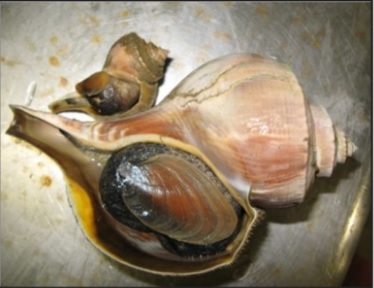
Conch May Be Doomed—by the Massachusetts DMF Target of Females
The sun permanently setting on a near half century old fishery processor in the nation’s lead commercial fisheries revenue port is not a pretty sight to contemplate. But it is real. And contemplated by a significant processor particularly well run key component to the channeled conch fishery supporting dozens of boats in Southern New England waters. New fishing rules increased the minimum legal landing size by 1/8” chute gauge width size bi-annually since 2019, each time reducing the commercial landings by 120,000 pounds—and revenues lost in that time over $500,000. The next increase is slated for 2023; independent marine economists say “the once $6 million annual fishery will be dropped from the recent annual landings of 806,000 pounds to about 600,000 pounds. Twenty boats will no longer economically function. And the fish processor loading dock will become part time. Or close. Or move out of state where species conservation and scientific awareness, and the fishery economics, will be in far better balance.” > click to read < 17:19
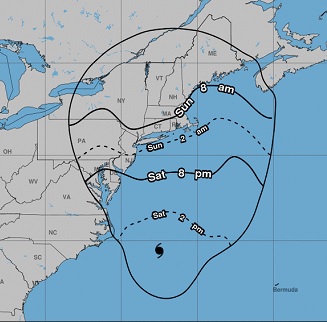
Hurricane Warnings In Effect for Parts of Long Island and southern New England
11:00 AM EDT Sat Aug 21, Location: 34.4°N 72.5°W, Moving: NNE at 14 mph – Hurricane and Storm Surge Warnings are in effect for portions of Long Island, New York, and southern New England with Henri. Henri is expected to accelerate northward on Saturday and make landfall in Long Island or southern New England on Sunday. In addition to hurricane conditions and dangerous surge, heavy rainfall may lead to considerable flooding in parts of New England Sunday into Monday. >click to read< – National Weather Center, >click here< 11:10
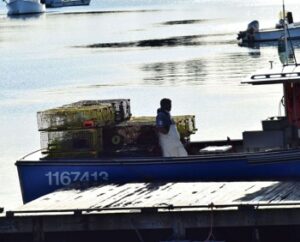
Lobster stock levels remain high in Gulf of Maine, but there is cause for concern
The “now” looks solid for local commercial lobster fishery, based on findings reported in the 2020 Atlantic States Marine Fisheries Commission Lobster Benchmark Stock Assessment, which reported the stock at “record high abundance levels.” The good news continued,, The news for southern New England, including southern Maine, remained poor, with a depleted fishery and no signs of resurgence. The research was conducted by several organizations, including the Department of Marine Resources, Gulf of Maine Research Institute and the University of Maine’s Sea Grant program and Lobster Institute. The assessment, released in October, was based on surveys conducted from 2016 through 2018. However, once the research turns to lobster settlements the future does not look as bright. >click to read< 18:29
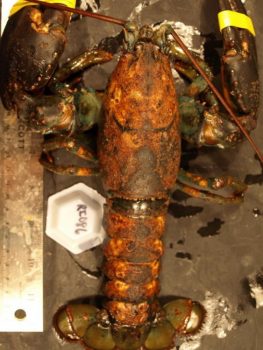
Solution to Lobster Shell Disease Remains Elusive, Blindness is also a growing concern
Despite more than 20 years of declining lobster populations in southern New England and extensive studies of the shell disease that is a major factor in their decline, scientists are still struggling to provide definitive answers to help restore hope to those working in the local lobster fishery. A new study of lobsters along the eastern Connecticut coast has found that the disease is linked to warming water temperatures, while progress is slow in efforts to identify probiotics to counteract the disease and to better understand why so many lobsters are blind. >click to read<11:37
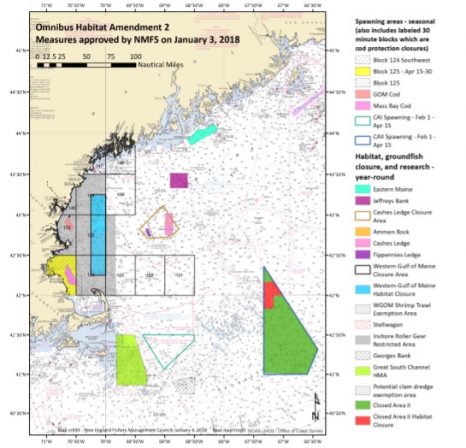
NMFS Approves “Majority” of Council’s Habitat Amendment
NOAA’s National Marine Fisheries Service (NMFS) has approved –with two exceptions –the New England Fishery Management Council’s Omnibus Essential Fish Habitat Amendment 2 (OHA2), paving the way for sweeping change to the existing network of closed and management areas in the Gulf of Maine, Southern New England, and Georges Bank. The changes will provide better protection for both fish and habitat while eliminating closures that no longer serve their intended purpose. click here to read the press release 16:20

New Southern New England lobster fishing rules on the way amid warming waters
New restrictions are coming to southern New England’s lobster fishery in an attempt to save the area’s population of the crustaceans, which has dwindled as waters have warmed. An arm of the interstate Atlantic States Marine Fisheries Commission voted on Tuesday to pursue new management measures to try to slow the decline of lobsters in the area. Management tools will include changes to legal harvesting size, reductions to the number of traps and seasonal closures to fishing areas. The board’s move was “a recognition that climate change and warming water temperatures play an increasingly role in lobster stocks, especially in southern New England,” said Tina Berger, a spokeswoman for the commission. click here to read the story 11:23
No new rules for declining southern New England lobstering
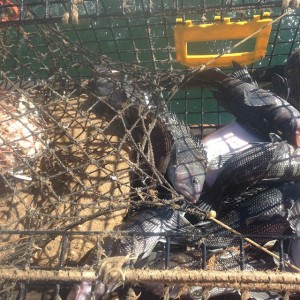 An interstate panel that manages fisheries voted on Tuesday against a plan to try to preserve the declining southern New England lobster population with new fishing restrictions.The New England lobster fishery is based largely in Maine, where the catch has soared to new heights in recent years. But the population has collapsed off Connecticut, Rhode Island, southern Massachusetts and New York’s Long Island as waters have warmed in those areas. An arm of the Atlantic States Marine Fisheries Commission considered a host of new restrictions about lobster fishing in southern New England on Tuesday and chose to shoot the plan down.,, “It’s time to think a little differently about how we are managing lobsters in southern New England,” board member Peter Burns said. “We know there are things we can do,” (it was a lively discussion!) click here to read the story 18:38
An interstate panel that manages fisheries voted on Tuesday against a plan to try to preserve the declining southern New England lobster population with new fishing restrictions.The New England lobster fishery is based largely in Maine, where the catch has soared to new heights in recent years. But the population has collapsed off Connecticut, Rhode Island, southern Massachusetts and New York’s Long Island as waters have warmed in those areas. An arm of the Atlantic States Marine Fisheries Commission considered a host of new restrictions about lobster fishing in southern New England on Tuesday and chose to shoot the plan down.,, “It’s time to think a little differently about how we are managing lobsters in southern New England,” board member Peter Burns said. “We know there are things we can do,” (it was a lively discussion!) click here to read the story 18:38
Proposed new rules for lobstering up for vote amid decline in southern New England
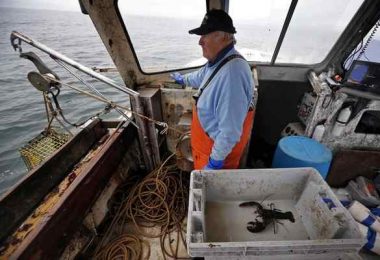 Scientists have said populations of lobsters off of Connecticut, Rhode Island and southern Massachusetts have declined as waters have warmed. A board of the Atlantic States Marine Fisheries Commission is scheduled to vote on new management measures Monday and Tuesday. Fishing managers are considering tools like trap reductions, changes to the legal harvesting size of lobsters and seasonal closures to try to preserve the population. Some lobster fishermen have opposed the possibility of new measures, saying such a move would kill off what remains of a once-vibrant fishery. “Any further reductions in traps would be hard to accommodate, given that there are so few fishermen left in (southern) Massachusetts and Rhode Island,” said Beth Casoni, executive director of the Massachusetts Lobstermen’s Association. click here to read the story 11:26
Scientists have said populations of lobsters off of Connecticut, Rhode Island and southern Massachusetts have declined as waters have warmed. A board of the Atlantic States Marine Fisheries Commission is scheduled to vote on new management measures Monday and Tuesday. Fishing managers are considering tools like trap reductions, changes to the legal harvesting size of lobsters and seasonal closures to try to preserve the population. Some lobster fishermen have opposed the possibility of new measures, saying such a move would kill off what remains of a once-vibrant fishery. “Any further reductions in traps would be hard to accommodate, given that there are so few fishermen left in (southern) Massachusetts and Rhode Island,” said Beth Casoni, executive director of the Massachusetts Lobstermen’s Association. click here to read the story 11:26
Southern New England Lobstermen question need for restrictions to help species
Some lobster fishermen expressed skepticism Tuesday about a plan to try to revive the dwindling southern New England lobster stock through 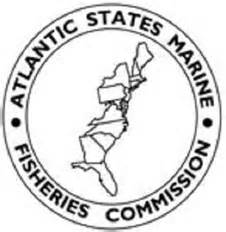 . Lobster fishing in the U.S. is experiencing a boom that has lasted several years, and prices have also been high. But the population of the species has diminished in the waters off southern Massachusetts, Rhode Island, Connecticut and Long Island, New York, where it was once plentiful. The Atlantic States Marine Fisheries Commission is considering a host of options to try to rejuvenate the region’s lobster stock, which scientists have said is falling victim to rising ocean temperatures. An arm of the commission voted Tuesday to send the options out for public comment. Read the story here 08:31
. Lobster fishing in the U.S. is experiencing a boom that has lasted several years, and prices have also been high. But the population of the species has diminished in the waters off southern Massachusetts, Rhode Island, Connecticut and Long Island, New York, where it was once plentiful. The Atlantic States Marine Fisheries Commission is considering a host of options to try to rejuvenate the region’s lobster stock, which scientists have said is falling victim to rising ocean temperatures. An arm of the commission voted Tuesday to send the options out for public comment. Read the story here 08:31
Draft plan unveiled to curb Southern New England lobster declines
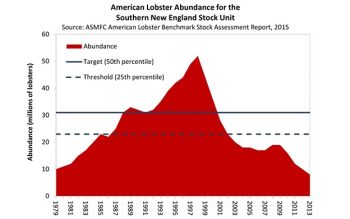 The American Lobster Management Board has released a draft plan responding to declining stocks of lobsters in Southern New England waters that will be considered by the Atlantic States Marine Fisheries Commission at its annual meeting in late October. The proposal presents a suite of management measures to increase egg production and lower harvesting mortality through a combination of management tools that include season closures, trap limits and reductions and changes in escape vent and lobster size regulations. The goal is to increase egg production for lobsters in Southern New England waters from zero to 60%. The draft responds to the 2015 American lobster benchmark stock assessment that found the Southern New England “stock severely depleted and undergoing recruitment failure with poor prospects of recovery,” according to Friday’s statement from ASMFC. Read the rest here 11:13
The American Lobster Management Board has released a draft plan responding to declining stocks of lobsters in Southern New England waters that will be considered by the Atlantic States Marine Fisheries Commission at its annual meeting in late October. The proposal presents a suite of management measures to increase egg production and lower harvesting mortality through a combination of management tools that include season closures, trap limits and reductions and changes in escape vent and lobster size regulations. The goal is to increase egg production for lobsters in Southern New England waters from zero to 60%. The draft responds to the 2015 American lobster benchmark stock assessment that found the Southern New England “stock severely depleted and undergoing recruitment failure with poor prospects of recovery,” according to Friday’s statement from ASMFC. Read the rest here 11:13
Restrictions on tap for southern New England lobster fishery
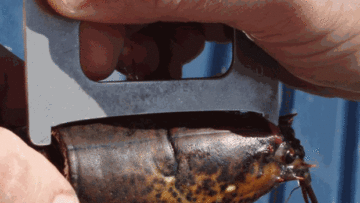 New restrictions are on tap for the region’s historic lobster fishery, which is grappling with an unprecedented decline. Scientists have said lobsters off southern Massachusetts, Rhode Island and Connecticut have declined in the face of the warming ocean. The Atlantic States Marine Fisheries Commission is considering ways to help preserve the species, and a report from the commission says one way to preserve lobsters could be to increase the minimum harvesting size. The commission’s lobster board might take action on the issue Thursday. “The biggest challenge I see is trying to establish an appropriate goal to manage the fishery in the face of what the scientists are telling us is the decline caused by ocean warming,” said Dan McKiernan, a member of the lobster board. Read the rest here 15:43
New restrictions are on tap for the region’s historic lobster fishery, which is grappling with an unprecedented decline. Scientists have said lobsters off southern Massachusetts, Rhode Island and Connecticut have declined in the face of the warming ocean. The Atlantic States Marine Fisheries Commission is considering ways to help preserve the species, and a report from the commission says one way to preserve lobsters could be to increase the minimum harvesting size. The commission’s lobster board might take action on the issue Thursday. “The biggest challenge I see is trying to establish an appropriate goal to manage the fishery in the face of what the scientists are telling us is the decline caused by ocean warming,” said Dan McKiernan, a member of the lobster board. Read the rest here 15:43
Opinion: NMFS Rule Recognizes that Fish Need Habitat, and if they don’t we’ll sue the sh!t out of ’em!
 Today, the National Marine Fisheries Service (NMFS) issued the final regulation regarding commercial fishing access to the longstanding protected habitat areas in the Gulf of Maine, southern New England, and Georges Bank. In May of this year, Conservation Law Foundation (CLF) sued NMFS over a related proposal to allow new fishing in over 5000 square miles of protected ocean habitat areas in New England. CLF brought the lawsuit due to a strong concern more@talkingfish 17:23
Today, the National Marine Fisheries Service (NMFS) issued the final regulation regarding commercial fishing access to the longstanding protected habitat areas in the Gulf of Maine, southern New England, and Georges Bank. In May of this year, Conservation Law Foundation (CLF) sued NMFS over a related proposal to allow new fishing in over 5000 square miles of protected ocean habitat areas in New England. CLF brought the lawsuit due to a strong concern more@talkingfish 17:23

































